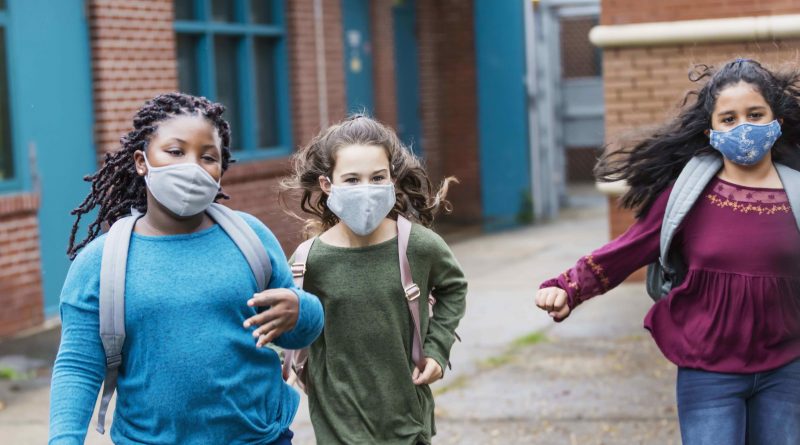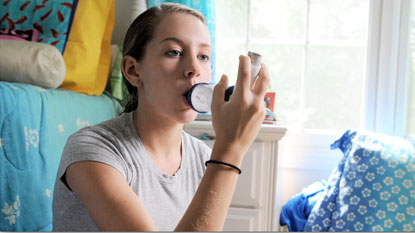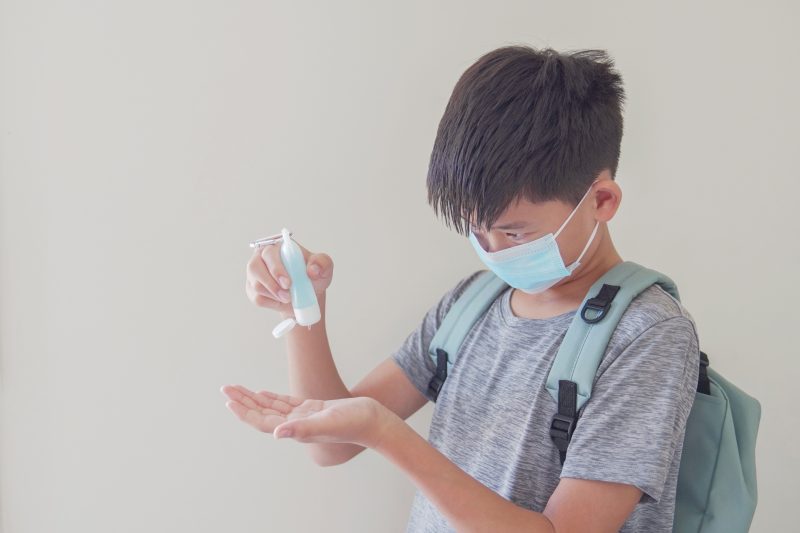
Prevention is the best way to reduce illness and asthma episodes but, if a child does shows signs or symptoms of infection, notifying a provider early may help to lower the risk for respiratory complications.
As guidance on COVID-19 continues to change, experts agree that focusing on the things we can control is the best medicine for preventing illness and asthma episodes this flu season.
Guidance on asthma:
Now is a good time to review your child’s asthma action plan with a provider and make sure you have the right medications to treat symptoms at home.
“The best way to prevent complications from COVID-19 and other respiratory viruses is to make sure asthma is well controlled. It can make the biggest difference for patients in today’s current environment,” said Lisa Sammon, DO, pediatric allergist/immunologist at Akron Children’s. “Improving one’s asthma control also helps to lessen complications and risk of hospitalization from other common cold viruses and influenza.”

Dr. Sammon says consistent use of inhalers remains the best way to control asthma symptoms. Using a device called a spacer is typically recommended and helps the user get more benefit from the inhaler. For a refresher, see our video.
According to healthychild.org, well-controlled asthma usually means your child is:
- Coughing on no more than 2 days per week.
- Waking up during the night from coughing no more than once per month (or no more than 2 nighttime awakenings for children 12 years and older).
- Needing 2 or less rescue treatments per week (this does not include pre-treating before exercise).
- Not requiring oral steroids such as prednisone in the last 12 months.
- Able to fully participate in regular activity without breathing limitations.
Be sure to talk with your children, too, about ways they can keep asthma under control. Wearing masks, avoiding people who are sick and minimizing exposure to allergens or irritants like cigarette smoke are key. Having symptoms under control will make wearing masks more comfortable in school or public. Masks don’t make asthma symptoms worse and are even more important for patients who have lung problems like asthma.
Guidance on flu:
A flu vaccine is the single best way to prevent the flu. It’s highly recommend that everyone 6 months of age and older get a flu shot (with rare exceptions). It’s true the flu shot doesn’t cover all strands of the flu, but experts agree it’s better to have protection of some strands than none at all. If your child does get the flu then flu-specific antiviral medications can lessen the severity and shorten the duration of flu.

Flu shots are one of the best ways to protect your kids from getting the flu.
Guidance on COVID-19:
COVID-19 and flu are both contagious respiratory illnesses but are caused by different viruses. The best way to prevent COVID-19 is to avoid exposure. For added protection, in June 2022, the Food and Drug Administration (FDA) advisors authorized emergency use of Moderna and Pfizer/BioNTech COVID-19 vaccines for children aged six months to five years old, making a vaccine available for most kids 18 and younger. Bivalent boosters that provide coverage against the Omicron variant will also be available for those aged 12 (Pfizer/BioNTech) and 18 (Moderna) in fall 2022.
COVID-19 affects different people in different ways and brings a wide-range of symptoms – from mild to severe. Since symptoms can be similar to those experienced with the flu, call your health care provider for guidance if your child is experiencing:
- Fever (temperature 100.4 °F or higher)
- Sore throat
- Nasal congestion
- New onset of cough (for a child with chronic allergic/asthmatic cough, see if there is a change from their usual cough)
- Diarrhea, vomiting, or stomachache
- New onset of headache
- Changes in or loss of taste or smell

Safe social distancing, good hand hygiene and wearing masks are recommended to help slow the spread of COVID-19.
All the things we do to protect ourselves against COVID-19 – safe social distancing, masking and good hand hygiene – should also help us protect against flu.
“Being mindful of prevention measures is the best first step. Next, it is vital to inform your child’s provider early if respiratory symptoms develop so the provider team can work together to reduce the risk of complications,” added Dr. Sammon.
For questions about the flu shot, COVID-19 vaccine or any of your child’s vaccinations, speak with your child’s provider. For help managing asthma, schedule an appointment with Akron Children’s Center for Allergy and Immunology.










